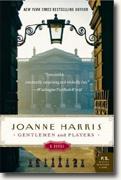Glen Huser's Movie and Book Picks for March 2011
My Movie Pick
As usual, I was glued to the TV during the Academy Awards, and I have to admit to audibly cheering when Colin Firth was announced as this year’s winner for best actor in The King’s Speech. What a wonderful performance! I’ve been a fan of Colin Firth for a long time, and for my March movie pick, I’m featuring a film (well, actually, a TV miniseries) that I haul out of my DVD closet and watch at least once every six months. No surprise to many of you, I’m sure, that I’m talking about the BBC production of Pride and Prejudice that came out in 1995.
I’ve loved Austen’s books ever since I studied Emma in a course on the English Novel that I took during my second year of university some 50 years ago. Over the next while I read all of her books, and it’s always been a toss-up for me whether Emma is her best – or Pride and Prejudice. Of the many film versions of Pride and Prejudice, this BBC production comes closest, I believe, to finding cinematic terms for Austen’s narrative. As a miniseries, it had the luxury of pace that took us not only from one manor house to the next but into the countryside of Staffordshire and Derbyshire. Such close attention was paid to details of costume and make-up and the furnishings of interiors that the viewer can’t help but feel he is stepping into those early years of the 1800s. I suspect designers must enjoy creating the trimmings – it’s an adventure in researching clothing and scrounging for antiques since Austen herself seldom went beyond describing a house or a hero as “handsome.”
And then there’s the cast. While Colin Firth can play the buffoon in pictures such as Bridget Jones’ Diary, he inhabits the role of Darcy here with a steady intensity and charm (as good, I believe, as Olivier in the MGM version of the 1940s). Firth, apparently, was reluctant to take on the role – feeling he wasn’t “romantic” enough for Darcy, but director Andrew Davies was able to convince him not only to be in the series but to submit to Davies’ ploys to make him pretty sexy (as we see him not only in Regency attire but soaking in a tub, and in his fencing duds, and swimming in the lake outside Pemberly). I can’t imagine a better Elizabeth Bennett than Jennifer Ehle, and Alison Steadman provides us with a portrait of Mrs. Bennett that makes us wonder why all of the Bennett girls didn’t run away from home – not just Lydia. David Bamber’s Mr. Collins, the prissy parson, is also a bit of perfect casting.
 March has been coming in like a lion here in Vancouver – and checking my schedule, I see I have nothing else on for this evening…so I think I may just need to sink into this re-creation of Austen’s world with its summery strolls through English country gardens, the candle-lit rooms of cotillions, and the lavish halls of Rosings and Pemberly.
March has been coming in like a lion here in Vancouver – and checking my schedule, I see I have nothing else on for this evening…so I think I may just need to sink into this re-creation of Austen’s world with its summery strolls through English country gardens, the candle-lit rooms of cotillions, and the lavish halls of Rosings and Pemberly.
My Book Pick
My book pick for March is Joanne Harris’s Gentlemen and Players. Harris is probably best-known for her novel  Chocolat which was transformed a few years back into everyone’s favourite dessert film – with tasty performances by Juliette Binoche, Johnny Depp and Judi Dench. In Gentlemen and Players, she provides us with a page-turner that probably won’t have you reaching for any cream-centres as we delve into a world where poison is only one of the devices employed by a murderer ensconced in a boys’ school that has seen better days.
Chocolat which was transformed a few years back into everyone’s favourite dessert film – with tasty performances by Juliette Binoche, Johnny Depp and Judi Dench. In Gentlemen and Players, she provides us with a page-turner that probably won’t have you reaching for any cream-centres as we delve into a world where poison is only one of the devices employed by a murderer ensconced in a boys’ school that has seen better days.
Harris draws on her own experience as a teacher for twelve years in a boys’ grammar school. In an afterword, Harris writes, “I wanted to teach even more than I wanted to write.” Confronting the entrenchment of old boys as pedagogues in such institutions, she indicates “As a young, female teacher, I had to be tougher than anyone else—although some days I was so exhausted I could hardly function…All my time was taken up with marking and preparing for teaching aids, and I had the words ‘Don’t let the bastards grind you down’ inked so deeply on my forearm that I was afraid they would become a tattoo.”
One of the central characters—and one of the dual narrators–in Gentlemen and Players is Roy Straitley, a free-spirited Classics professor reaching his 65th year, who has little patience with the administrivia of St. Oswald’s, while at the same time harboring a Mr. Chips kind of attachment to the institution. The other narrator is a new teacher who has had a hidden history with the school and the narrative slips back and forth between this character’s troubled childhood and the beginning of this school year in which the new instructor begins instituting an agenda of misadventure and murder – carefully-staged acts of revenge.
The chapters unfold as if they were moves in a game of chess. I was reminded of another mystery in which the reader finds himself walking in the shoes of a murderer – Patricia Highsmith’s The Talented Mr. Ripley, which I have to admit enjoying a great deal. It’s an unsettling stance – making the reader somehow complicit — but seductive in a way too. As readers we find ourselves thinking – okay, how am I going to pull this off; how am I going to cover my tracks? Yikes – do we all have a bit of murder in our hearts? Maybe—when we think back to mistreatment and injustices during our school years?
You might think that by putting us into the shoes of the murderer, Harris has sabotaged the prospects that all good mysteries aim for – to surprise the reader – but she manages something of a tour de force here. There are all kinds of twists and turns and surprises. We walk in Roy Straitley’s shoes too and find ourselves making the mistakes of assumption he makes. Clever scripting, Miss Harris!
Hi Glen –
Thanks for the picks this month!
Also, Colin Firth is heart-stopping brilliant in the film A Single Man, which prompted me to go and buy the novel by Graham Greene, though I have not yet found the time to read it …
I also thought Colin Firth turned in a wonderful performance in “A Single Man”. The film is based on a Christopher Isherwood story, I believe.
You are absolutely right, Glen!
I have the Isherwood book on my shelf next to The Quiet American by Greene.
Interesting that Joanne Harris felt she “wanted to teach more than she wanted to write”–you don’t hear that very often from authors these days, do you? I don’t seem to. I think the reading public is skeptical of writers who profess they prefer teaching to writing.
To me, it seems that so little attention is paid to those individuals who are brilliant teachers (they may also be brilliant writers) — the teaching profession is supremely undervalued, perhaps, because the teachers’ “deliverables” are not so immediate and obvious and lucrative as a new best-selling novel. Good teachers make an “investment” in the potential they may see in their students, even though those students may not achieve their talent potential for years, or decades even.
I’m in the midst of reading Pat Conroy’s new book “My Reading Life” and he has a very touching chapter in it entitled “The Teacher” about a high school instructor who had enormous impact on his life and writing career. He took Conroy, a battered child, under his wing and opened vistas in life and literature that brought him to a love of the written word that would spill over into his own crafting of literature. Conroy valued Gene Norris’s friendship and kept in close touch up to the teacher’s death. In their last telephone conversation, a dying and near-inarticulate Norris insisted that Conroy “tell him a story.” Conroy writes: Those were the last words he ever spoke to me, and they formed an exquisite, unimprovable epitaph for a man whose life was rich in the guidance of children not his own. He taught them with a language that was fragrant with beauty, treacherous with loss, comfortable with madness and despair, and a catchword for love itself…